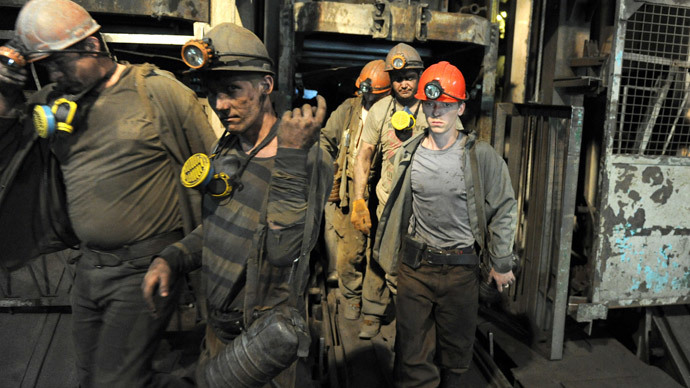'With no tangible economy it will be hard for Ukraine to pay off its debt’

Nobody is going to invest in an economy when there is no rule of law, and any certainty that assets will not be in some way squandered, taken away through bribery, or indeed outright stolen, global finance expert Patrick Young told RT.
RT:The IMF expects Ukraine's debt to exceed 62% of its GDP by the end of the year. In your view, is that an accurate picture?
Patrick Young: This is, if anything, possibly a conservative picture, but it is certainly overall accurate giving the information we have. The situation in Ukraine is that obviously it is incredibly difficult when you have had some sort of insurrection on the streets, a revolution, and lots of upheaval because this impacts the economy. And therefore, it is incredibly difficult to get your statistics absolutely precise at such a time. But overall, the IMF is generally getting the right picture.
RT:How big of a problem, or otherwise, is this debt for the country's economy?
PY: Of course having a debt to GDP ratio of 62 percent seems like a wonderful thing if you are the US that is over 100 percent, Italy that is 120 percent and growing rapidly, Greece that is somewhere in the stratosphere [with] a couple of hundred percent or more. Obviously that is an issue, but actually when we look at Ukraine in isolation, what we have to understand is the fact that ultimately the Ukrainian economy is very weak. Therefore, Ukraine has historically had very little foreign debt for the simple reason that actually foreign investors are not dumb enough to lend money to economies that do not function. We have seen Ukraine having quite often 20-30 percent to GDP, which is fabulously easy to manage. Now it has reached this point of 60 percent, which a lot of economists regard as being almost a point of no return, it is a point at which the normal functioning economy has difficulty paying its debt. The problem is of course Ukraine is not a normal functioning economy, it is a remarkably backward economy, and an economy that has gone nowhere for 25 years and at the moment is getting appreciably worse.

RT:Given the size of the debt and the rate of interest, how hard will it be for Ukraine to pay off its IMF loan?
PY: It is really a tragedy for the people of Ukraine. What we see at the moment is an economy that is on the verge of a death spiral. We have obviously seen all the sorts of terrible warfare that is happening within the borders of the country that is a tragedy because actually it is the eastern corner of the country around Donetsk, where in fact industry is, that really adds to the overall GDP. Therefore, we have a problem because of course we have the loss of Crimea reverting to Russia, the Ukrainian economy, the Ukrainian nation has shrunken appreciably in the course of the last year but ultimately the amount of debt that it caused is going up. How is it going to pay for that? I really don’t know, it is going to be incredibly difficult, because what we need to see is an end to the oligarchy rather than another oligarchic president. A continuation of a sort of economic reform that has been sensationally successful in neighboring Poland. Bear in mind the fact that we are coming today from Torun in Northern Poland, this is the city which is along with the country is thriving. Why? Because it took its economic mechanism, it took its economic medicine 25 years ago; it worked incredibly hard to reach the level of prosperity, where it is breaking through towards the premier league of nations. Tragically, Ukraine is featuring the point at this stage of relegation from being economically viable. That’s the tragedy. Can they pay off their debt? It is going to be incredible difficult because let’s face it, what is the news we hear from Ukraine all the time? Terrorism, problems. Who is going to invest on the back of that? Nobody. Who is going to invest into an economy when you don’t have clear rule of law, where you cannot appreciably believe that your assets will not be in some way squandered, taken away through bribery or indeed outright stolen. Nobody. That’s why Ukraine is on the brink of economic collapse, and it is going to take a lot more than simple IMF loans, and indeed lots of money, like half a billion, being poured in to prop up what the EU has given it already. Ultimately we see a terrible situation for Ukraine; it is going to find it very hard to pay off its debt because unfortunately, there is no seriously tangible economy within the country.
RT:Kiev estimates that the country has a natural gas deficit of at least 6 billion cubic meters. What does that mean for Ukrainians? Do you think it’s a good idea to resort to gas rationing in such a situation?
PY: Naturally the first thing that I would happen to do if I were unfortunate enough to be Ukrainian president is that I probably wouldn’t agitate the people that are actually exporting my gas because I want my pensioners, my citizens being kept warm during the course of the winter. This is a huge problem for Ukraine, but ultimately it is not just about gas, it is the fundamental lack of viability in the Ukrainian economy. Ultimately, if we want to borrow a good old-fashion totalitarian metaphor and mix it up a little bit we could say “Ultimately Ukraine has no economy, therefore there is no problem.” That is how great the problem is and we sit at the edge of Europe with a problem. Ukraine is about to disappear into the abyss without fundamental economic reform and that means it needs to get its act together very rapidly.
The statements, views and opinions expressed in this column are solely those of the author and do not necessarily represent those of RT.
The statements, views and opinions expressed in this column are solely those of the author and do not necessarily represent those of RT.













